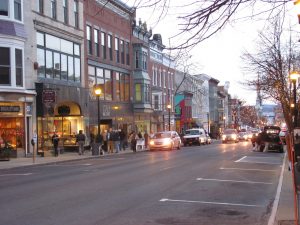A marketer friend in Connecticut sent out a wonderful tribute to his 95-year-old mom and used her to illustrate several points about customer-centric marketing and customer service. In the course of this article, he waxed rhapsodic about Amazon. I see Amazon (and some other companies) as not always so wonderful–and the public having blinders on about its predatory practices. So I wrote back to my friend. This is a slightly modified version of that letter, with a few extra links added. The third link is actually a very complete summary of the issues:
Great piece! I love the way you take your mom’s everyday activities and spin them into marketing do and don’ts.
While you certainly shouldn’t change it for Mom, you might want to rethink Amazon. It is very much a two-edged sword. It’s great that it has made the Long Tail [the ability to find obscure products that don’t support a large retail base and wouldn’t be stocked in physical stores] a thing and that any author has access to international markets. But…
- They are a serious threat to the vibrancy of our downtowns. Can you imagine Stamford with only a few struggling chain stores? Goodbye to that nice falafel shop and Asian restaurant across the street from (Amazon-owned) Whole Foods (I’ve often eaten at one or the other on my way to NYC). Book stores, hardware stores, appliance stores–and all the traffic into town those stores bring–are increasingly shaky in an Amazon-dominated world. And when that foot traffic goes away (assuming it comes back after we’re finally out of quarantine), so do the restaurants, night spots, etc.
- Their labor record is very poor. Their treatment of independent publishers is not only very poor but IMHO a violation of monopoly rules. Did you know that Amazon, a retailer, takes the 55% industry-standard wholesaler discount instead of the 40% retailer level for its smaller publishers selling them physical books? (They do have much better deals for publishers on the books their subsidiary KDP prints on demand.) This is one of the two reasons they’re killing the independent bookstores (the other is that they’ve successfully trained the public to think of them first). Also, they present used and new versions of the same title on the same results page, which is a complete stab in the back to publishers–sort of like offering counterfeit designer watches and purses. I have no objection to selling used books (and keeping them out of landfills)–but not in direct competition with the same book, new.
- For a long time, Amazon didn’t charge sales tax, which was an especially cruel anticompetitive practice in that it not only hurt businesses who have to collect those taxes, but also reduced the availability of government services by reducing government revenues.
- Amazon has actively and repeatedly suppressed competitors. This includes using its enormous data on customer behavior and buying patterns to manufacture its own products, sold through its own channels. And students of the company’s behavior see evidence that once competitors are eliminated or demand spikes (as on household cleaning products during the pandemic), Amazon’s prices rise, sharply.
For these reasons, I buy from my local independent food markets, booksellers, appliance, and hardware stores (on their websites, currently) and shortly after Amazon bought it, I stopped going to Whole Foods even though it’s actually my closest supermarket.
That was the end of my letter. I love the convenience of online ordering too, but I’m happy to do it at the websites of independent businesses, especially if they’re local to me. What are your thoughts?
